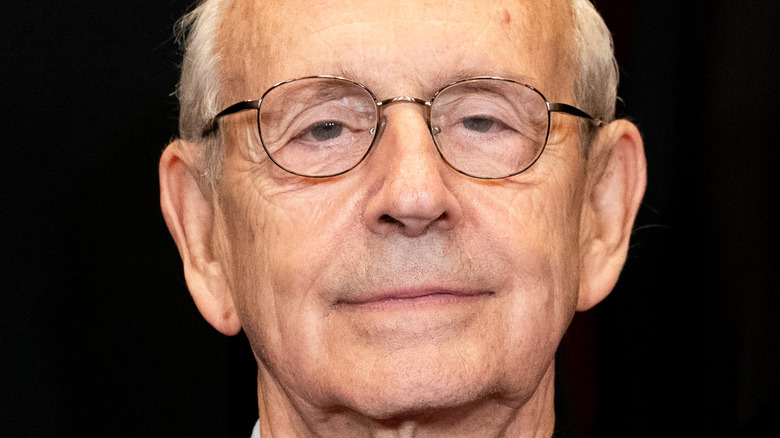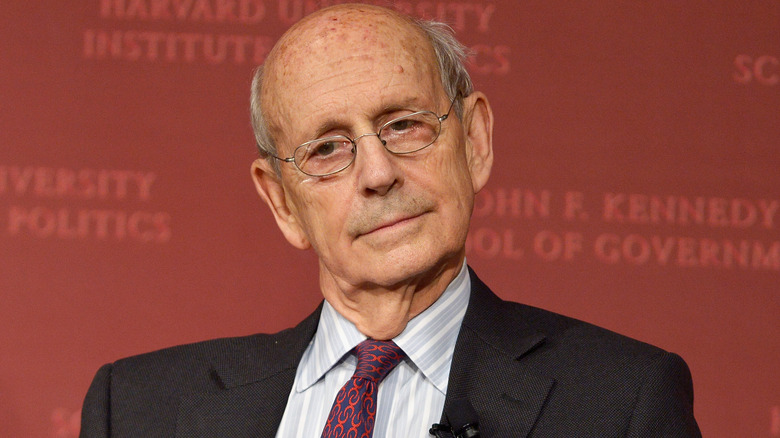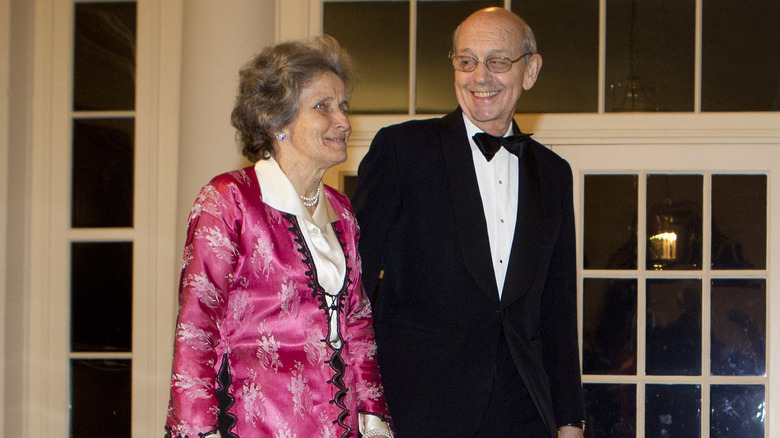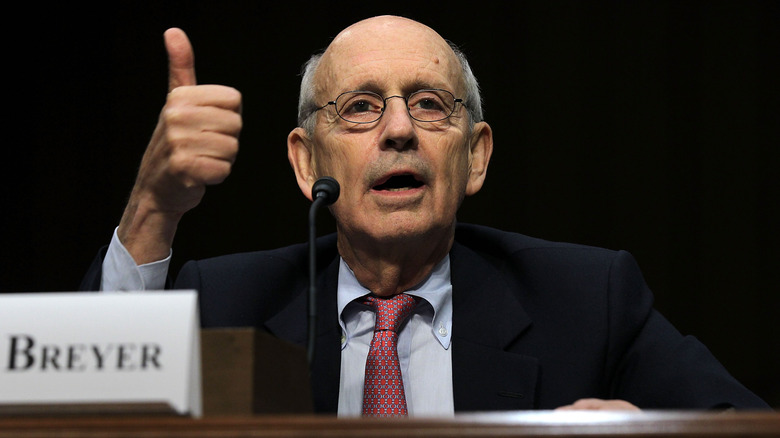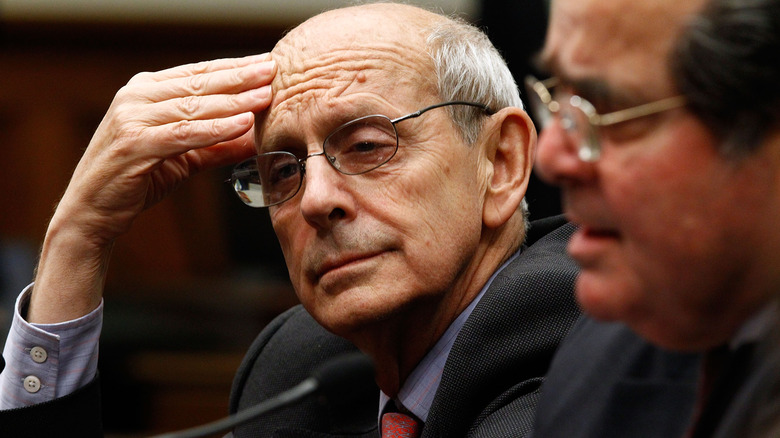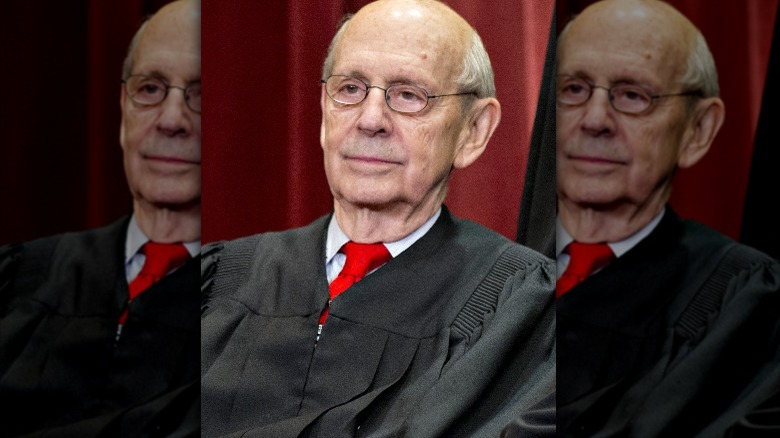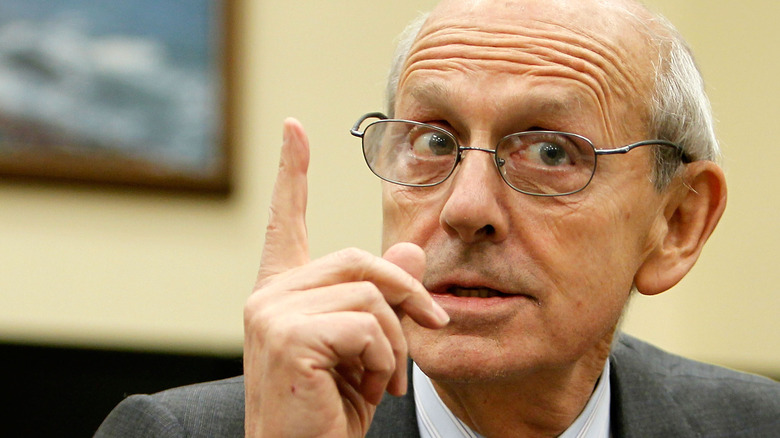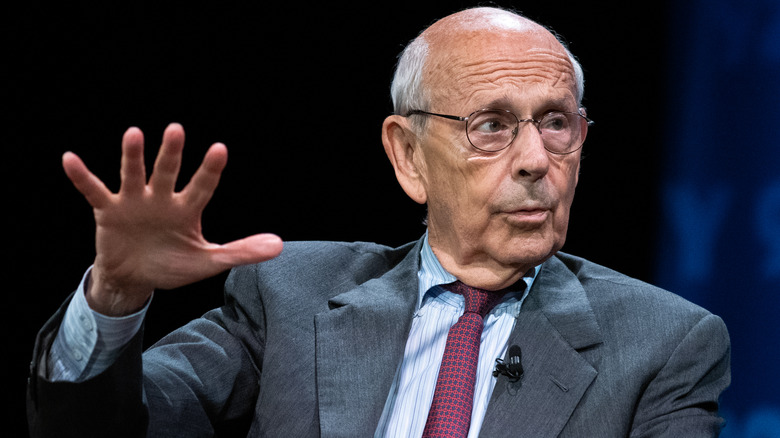The Untold Truth Of Stephen Breyer
We may receive a commission on purchases made from links.
After 27 years on the U.S. Supreme Court, a source close to Justice Stephen Breyer revealed that Breyer is expected to step down from his position at the end of his term in summer 2022. Although Breyer has not officially announced his retirement, NBC News reported that this decision will allow President Joe Biden to appoint a new justice who could serve in the decades to come and push the Democrats in office to refocus their attention on pressing social issues. Breyer has served the highest court since 1994 after being appointed by former President Bill Clinton.
Breyer was born in San Francisco on August 15, 1938, and was inspired by his parents, Irving and Anne Breyer, at a young age to become involved in public service (per Biography). After serving more than two decades on the Supreme Court, Breyer's retirement announcement doesn't come as much of a surprise. Although he isn't known in pop culture like his late colleague Ruth Bader Ginsburg, who enjoyed a fairly stunning net worth, there are definitely some things you probably don't know about him that will, for sure, come as a surprise. Keep reading to learn the untold truth of Stephen Breyer.
Prior to his lengthy legal career, Stephen Breyer was an Eagle Scout who dug ditches
From Eagle Scout and ditch digger to Army Corporal, Stephen Breyer had several other roles before his time on the high court. In fact, he was the only Supreme Court Justice to be selected that was a former Eagle Scout, a title he received while attending public school (via ABC News). Later on, in 1957, he joined the U.S. Army Reserves where he worked in Army Strategic Intelligence. During the summer of 1958, he worked as a ditch digger for the Pacific Gas and Electric Company. According to Britannica, he received his bachelor's degrees from Stanford University and the University of Oxford, where he studied economics, philosophy, and politics. Later, he attended Harvard Law School, where he worked on the Law Review and graduated with highest distinction, according to The Hollywood Reporter.
Breyer started his law career clerking for Supreme Court Associate Justice Arthur Goldberg between 1964 and 1965, per The Washington Post. After becoming the U.S. Assistant Attorney General for Antitrust and then a Harvard law professor in 1967, Breyer served as assistant prosecutor during the Watergate hearings in the 1970s. It wasn't until 1980 when former President Jimmy Carter first appointed him to the federal bench. Breyer served 13 years until then-President Bill Clinton selected him to replace Justice Harry Blackmun on the Supreme Court. And the rest, as they say, is history.
He married into English aristocracy
Amidst the busy everyday life of studying and working in law, Stephen Breyer was able to find love early on. Apart from his continued academic and professional success in 1967, he also tied the knot that year with his wife, Joanna Hare, a psychologist. A member of the British aristocracy, Hare comes from a wealthy English family: She is the daughter of John Hare, a wealthy British viscount who briefly led the Conservative party.
Together, Breyer and Hare raised three children, Chloe, Nell, and Michael, and made a comfortable life for themselves, as The Washington Post noted. Although the Breyer children stayed out of the spotlight for the majority of their lives, the Supreme Court Justice's youngest son followed the same path as his father, running as the Democratic candidate for District 19 of the California State Assembly in 2012, though, sadly, he did not win.
According to The U.S. Sun, the couple has been happily together for over 50 years and have each achieved incredible accomplishments in their careers. Hare is well known for her work with the Dana-Farber Cancer Institute in Boston. Additionally, she published a book in 2018 called "When Your Child Is Sick: A Guide to Navigating the Practical and Emotional Challenges of Caring for a Child who is Very Ill."
He is a longstanding liberal passionate about protecting abortion rights
Stephen Breyer is known for voting alongside the Supreme Court's liberals and for his memorable and everlasting opinions on social justice issues, including abortion rights, gun laws, the death penalty, and the First Amendment. Growing up, his mother actively volunteered for the League of Women Voters (via Biography), which could explain his passion for sticking up for women's reproductive rights throughout the course of his career.
Breyer is a firm believer in upholding the legal precedent set in Roe v. Wade, which protects abortion rights, and has led two major court cases regarding the issue. In 2000, during the Stenberg v. Carhart case, Breyer wrote that criminalizing partial birth abortions violated the U.S. Constitution and took away a woman's right to choose what is best for her and her body. "All those who perform abortion procedures using that method must fear prosecution, conviction, and imprisonment," Breyer wrote. "The result is an undue burden upon a woman's right to make an abortion decision" (via USA Today).
Now, as Breyer makes his way toward retirement, President Joe Biden has the opportunity to continue Breyer's legacy in the next Supreme Court Justice he selects, and he plans to appoint a Black woman as Breyer's replacement. Appointing another liberal justice is important to uphold the legal precedent set by Roe v. Wade, which protects women's right to choose.
Stephen Breyer has been outspoken about the death penalty
U.S. Supreme Court Justice Stephen Breyer is not only vocal about protecting abortion rights, but also his feelings regarding the constitutionality of the death penalty. Breyer claimed there are several constitutional defects in the administration of the penalty amidst the 2015 Glossip v. Gross case that stood at a 5-4 majority. The case determined whether the drug Midazolam, used in execution in Oklahoma, violates the Eighth Amendment's precedent against cruel punishment (via the American Bar Association).
Breyer noted three defects in the Constitution that labeled the death penalty as "cruel": unreliability, arbitrariness, and unconscionably long delays (via the American Bar Association). "Rather than try to patch up the death penalty's legal wounds one at a time, I would ask for full briefing on a more basic question: Whether the death penalty violates the Constitution," he stated (via USA Today). "At the very least, the court should call for full briefing on the basic question."
Stephen Breyer is one of only eight Jewish Supreme Court Justices
Throughout Stephen Breyer's more than two decades serving on the U.S. Supreme Court, he is one of only eight Justices — among the 115 total who have served the Supreme Court — to be Jewish. Although he very rarely speaks publicly about his religious beliefs and values, in November 2014, he reflected on how some of the percepts of the Torah's emphasis on justice influenced his work on the Supreme Court (via The Wall Street Journal). "Words come into my mind, probably from Temple Emanu-El in San Francisco, probably when I was 12 years old or 14," he said during a Jewish Federations of North America convention.
He continued, stating that, when he thinks of social justice, he thinks of the term "tzedakah," Hebrew for justice or righteousness. "It's not quite pure charity, like giving through love. And it's not quite the rule of law either. But it is trying to create a better world," as Breyer described the term and how it's contributed to his beliefs and decision making.
He is passionate about French culture
Like many, Stephen Breyer is passionate about Paris and everything the French culture has to offer, including its literature and beautiful language. In April 2013, Breyer was inducted into the French Academy, a major cultural institute, according to The New York Times. He was selected to become one of only 12 non-French members, alongside 50 other French men and women, as a replacement for Prince Otto von Habsburg, the patriarch of the Austrian dynasty who died in July 2011. Other members of this organization date back to Thomas Jefferson and include other French outsiders, such as Prince Charles of Britain and former U.S. President Ronald Reagan.
After the ceremony, Justice Breyer spoke on how honored he was to have been chosen. "The event is a recognition by a great institution of France of the institution to which I belong, the Supreme Court," Breyer said. "Our institutions flow from the enlightenment, and we've always seen our institutions working together." Breyer's speech about his professional accomplishments was followed by a second speech in French, so, thankfully, he didn't pull an "Emily in Paris" moment and learned how to speak the language!
The Supreme Court Justice hasn't had much luck riding bicycles
Outside of his passion for law, Supreme Court Justice Stephen Breyer has many other interests, which include cooking, bird-watching, and riding bicycles, according to The Washington Post. However, he has, unfortunately, found himself in a number of bicycle accidents throughout his life and has been hospitalized not once, not twice, but three times. How did those accidents happen?
According to USA Today, Breyer's first bike accident occurred in 1993 when he broke a few ribs and punctured his lung after being hit by a car while riding in Boston. According to the Los Angeles Times, he even left the hospital early just so he could still interview and be considered for the Supreme Court position after his nomination from then-President Bill Clinton. Then, in 2011, he was in another bike accident in Cambridge, Massachusetts, where he broke his collarbone.
In April 2013, the U.S. Supreme Court Justice found himself in yet another bicycling accident when he broke his right shoulder after falling off his bike in downtown Washington, D.C. He was taken to the MedStar Georgetown University Hospital and underwent shoulder replacement surgery.
Hopefully, in his upcoming retirement, Breyer has better luck on his bike!
